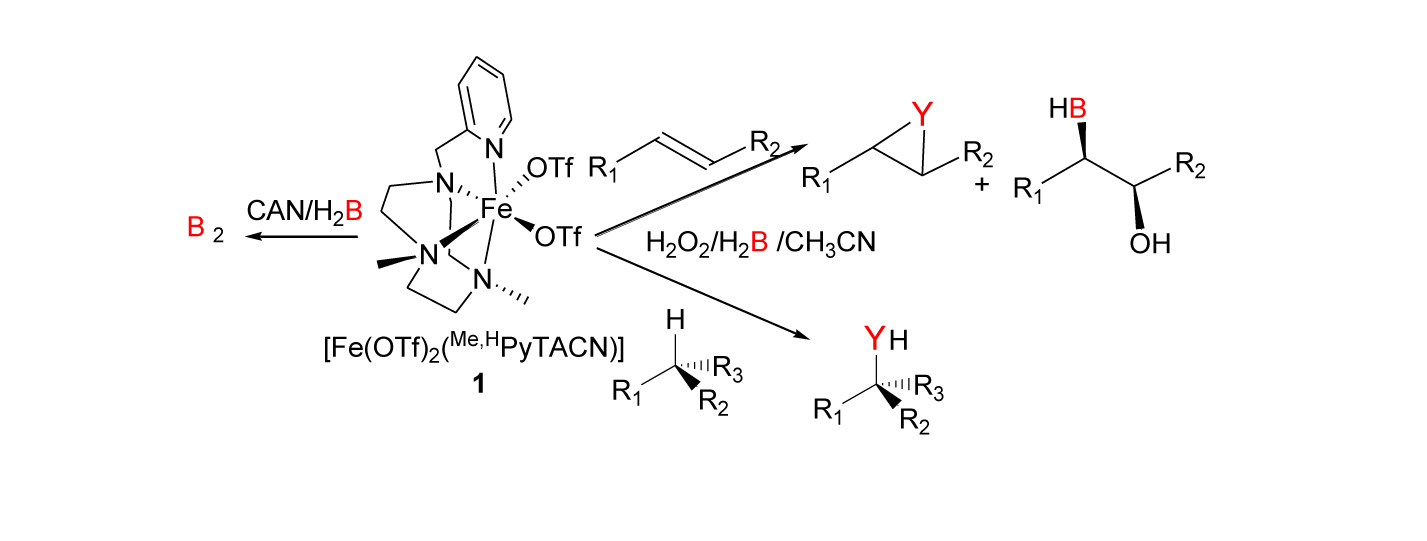Frontier Leaders: Selective Oxidation with Non Heme Iron Complexes that Support High Oxidation States
Miquel Costas, University of Girona, Girona, Spain
| When |
22 Jan, 2013
from
11:00 am to 12:00 pm |
|---|---|
| Where | Auditorium |
| Add event to your calendar |
|
Frontier Leaders Seminar
Title: Selective Oxidation with Non Heme Iron Complexes that Support High Oxidation States
Speaker: Miquel Costas
Affiliation: Chemistry Division, University of Girona, Girona, Spain
Abstract:
The formation and cleavage of the O-O bond is arguably the most important reaction in living organisms. Reductive O-O breakage takes place in cytochrome C oxidase.[1] This reaction constitutes the basic constituent of cellular respiration in aerobic organisms, and represents a primary source of energy. O-O cleavage also takes place in oxygenases,[2] and this reaction results in the generation of highly electrophilic high valent metal-oxo species, responsible for oxidative transformations. On the other hand, O-O bond formation takes place at a Mn4Ca cluster in the Oxygen Evolving Center of Photosystem II (PSII) of green plans and some bacteria. In both oxidative and respiration enzymes, metal ions adopting high oxidation states result from reductive O-O cleavage reactions while in PSII they are responsible for O-O bond formation.[3]
Selected coordination complexes that reproduce structural aspects of enzymatic active sites have been shown to catalyze analogous reactions, and recently some of these complexes have turned into very attractive tools for organic synthesis.[4] In addition, the study of the mechanisms of action of these catalysts has shed light into the molecular details of enzymatic systems. Our research group undertakes this approach and aims at studying the chemistry of iron coordination complexes with chemically robust nitrogen-based ligands, and which can sustain high oxidation states.[5-7]

[1] S. Ferguson-Miller, G. T. Babcock, Chem. Rev. 1996, 96, 2889-2907.
[2] a) M. Costas, M. P. Mehn, M. P. Jensen, L. Que, Jr., Chem. Rev. 2004, 104, 939-986. B) B. J. Wallar, J. D. Lipscomb, Chem. Rev. 1996, 96, 2625-2658. C) E. I. Solomon, et al. Angew. Chem. Int. Ed. 2001, 40, 4570. d) S. Shaik, et al. Chem. Rev. 2010, 110, 949-1017. e) E. G. Kovaleva, J. D. Lipscomb, Nat. Chem. Biol. 2008, 4, 186-193.
[3] Y. Umena, K. Kawakami, J.-R. Shen, N. Kamiya, Nature 2011, 55.
[4] a) L. Que, W. B. Tolman, Nature 2008, 455, 333-340. b) A. Company, et al. in Iron-Containing Enzymes, Versatile Catalysts of Hydroxylation Reactions in Nature (S. P. De Visser, D. Kumar), RSC, Cambridge, 2011.
[5] a) A. Company et al. J. Am. Chem. Soc. 2007, 129, 15766. b) L. Gomez et al Angew. Chem. Int. Ed. 2009, 48, 5720.
[6] a) A. Company et al. Chem. Eur. J. 2008, 14, 5727. b) I. Prat et al. Nat. Chem. 2011, 3, 788.
[7] I. Garcia-Bosch Adv. Synth & Cat. 2012, 354, 65.
[8] J. Lloret-Fillol Nat. Chem. 2011, 3, 897
Short CV:
Miquel Costas graduated in Chemistry at the University of Girona (UdG) in 1994, where he also pursued PhD studies in the group of Prof. Llobet. Research work during the PhD involved scientific stays at Texas A&M under the supervision of late Prof Derek Barton (1996), and in Basel at the group of Prof. Andreas Zuberbüehler (1998). After defending the PhD dissertation, he moved to the group of Prof. Lawrence Que, Jr, at the University of Minnesota. In September 2002 he returned to Girona with a Ramon I Cajal Fellowship. In 2006 initiated his independent career. His research interests involve the fundamental understanding of the mechanisms of O2 activation and/or substrate oxidation taking place at transition metal ions that have biological relevance, specially Fe, Cu and Mn, and application of this knowledge to the development of bioinspired oxidation catalysts to carry out selective oxidation reactions under environmentally benign conditions. In 2008 he was awarded with the ICREA Academia Award from the Generalitat de Catalunya and a Starting Grant from the European Research Council.
In December 2012, scientific productions include over 60 publications in international journals, that have received over 3000 citations. Hircht index is 24.









